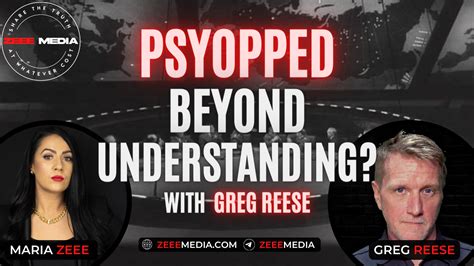 Greg Reese joins Maria Zeee to discuss the depth of the complexity of the main goal of the New World Order, exploring whether we are being psyopped beyond our understanding in ways that are preparing us to accept a one-world leader…. Video below
Greg Reese joins Maria Zeee to discuss the depth of the complexity of the main goal of the New World Order, exploring whether we are being psyopped beyond our understanding in ways that are preparing us to accept a one-world leader…. Video below
Human “psychological operations” (PSYOP), which is a form of information warfare or strategic communication used by governments, military organisations, or other entities to influence the emotions, attitudes, and behaviour of a target audience. These operations are typically aimed at affecting the perception of individuals or groups to achieve specific objectives.
In the context of “psyopped,” it usually refers to the act of being subjected to psychological operations or manipulation. This might involve being exposed to propaganda, disinformation, or other tactics designed to shape opinions or beliefs
“Psychological Operations” (PSYOPs), also known as psychological warfare or information warfare are tactics used to influence the attitudes, behaviours, and beliefs of a target audience. They can be employed by governments, military organizations, or other groups to achieve specific objectives, such as gaining support for a cause, reducing the morale of an enemy, or shaping public opinion.
When used ethically and responsibly within legal and humanitarian boundaries, psychological operations may involve disseminating truthful information, countering propaganda, or providing psychological support to affected populations. However, if employed in unethical or harmful ways, they can be dangerous and raise serious ethical concerns.
Some potential dangers of psychological operations include:
- Misinformation and manipulation: If PSYOPs involve spreading false information or manipulating facts to deceive or mislead people, it can be harmful to individuals and society as a whole.
- Targeting vulnerable populations: Using psychological tactics on vulnerable groups, such as children or mentally ill individuals, can be exploitative and unethical.
- Destabilizing effects: In some cases, psychological operations can inadvertently contribute to destabilizing regions or exacerbating existing conflicts.
- Violating international law: The use of psychological operations should comply with international law, including humanitarian and human rights law. Unlawful or unethical use can lead to legal consequences.
- Erosion of trust: If people become aware of psychological operations targeting them, it can erode trust in institutions, governments, or media sources.
It is crucial to differentiate between ethical and responsible information campaigns aimed at informing and engaging the public and manipulative, harmful psychological operations. The implementation of psychological operations should be subject to oversight, accountability, and adherence to ethical principles to mitigate potential dangers.

